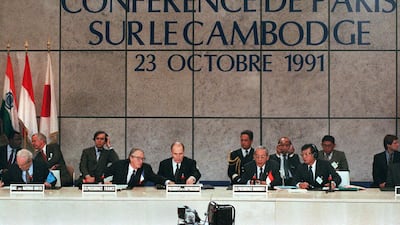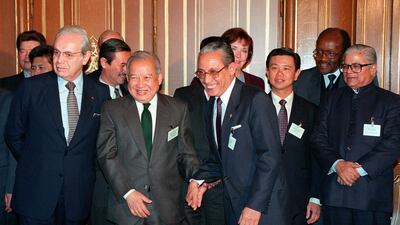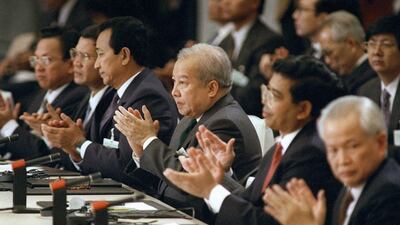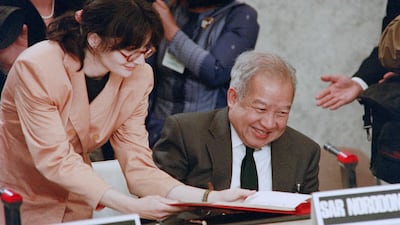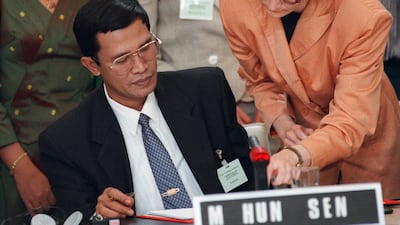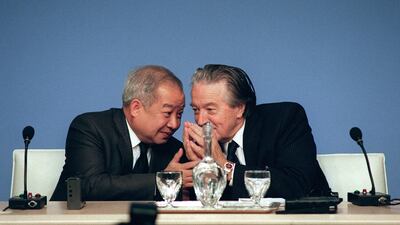Cambodia has just marked the 30th anniversary of the 1991 Paris Peace Accords, which paved the way to ending the country’s long-running civil war. The agreement remains a just cause for celebration: in the previous two decades, Cambodia had suffered the CIA-backed coup of Lon Nol, the genocidal rule of the Khmer Rouge during which up to two million people perished, and invasion by Vietnam. The UN Transitional Authority in Cambodia, which was formed to implement the accords, supervised the run-up to elections in 1993 and the subsequent assembly approved a new constitution.
In the years since, "we have reduced poverty and we have been happy with our economic growth", a spokesman for Hun Sen’s Cambodian People’s Party (CPP) government told Khmer Times. "We have had regular elections. Most importantly we have protected the people. That is why we have not allowed anybody to cause 'rain and storm' that destroy the safety and lives of the people."
That's one way of assessing the post-1991 record of Hun Sen, who in three slightly different guises has been prime minister of Cambodia since 1985. Another verdict on the results of the peace accords that he himself helped to negotiate comes from Australia's former foreign minister Gareth Evans. "We did a great job on bringing peace, but blew it on democracy and human rights," he said recently.
If there were any doubts about that, they were dispelled in 2017, when the country's Supreme Court dissolved the Cambodia National Rescue Party (CNRP), the only effective opposition to the CPP. The following year, the CPP won every place in the country's 125-seat Parliament, leading a CNRP official to say Cambodia was becoming "a one-party state with one man making all decisions for the entire nation through a sham election rejected by democratically elected governments". What had happened to a state that was supposed to be a "poster child" for UN-sponsored national reconstruction that would "shepherd a long-suffering people toward the promised land of democracy, free-market prosperity and human rights", as Sebastian Strangio, author of the magisterial Hun Sen’s Cambodia, put it?
Part of the problem is that in many respects the country did appear to be on that very trajectory. The English-language media was free, civil society flourished, and elections were fiercely fought: the CNRP came close to winning the 2013 general election. Sure, there were bumps in the road, to put it mildly, and episodes of serious violence, but it would have been naive to expect Cambodia to turn into a model liberal democracy overnight.
Warning signs were not properly heeded.
In 1993, for instance, Hun Sen defied the election results and stayed on in office after reaching a power-sharing agreement with the victorious Funcinpec party. He managed to do this by quelling a secession movement in the country's east that his critics claim he orchestrated to remain in power. In 1997, he took over as the sole leader after a coup.

Hun Sen, however, always did just enough to present the necessary veneer: he went on to hold elections in 1998 that the CPP won. The veneer had vanished by the 2018 election. By then it was clear that the liberal civic society international donors thought they were helping build was no more than a "mirage on the Mekong", to use Strangio’s evocative phrase.
It would be easy to see this as yet another instance of failed "democracy promotion" by well-meaning outsiders with insufficient knowledge of the countries they were trying to help. After all, most states that have successfully made the transition from authoritarian rule to democracy in recent decades have led the process themselves, from the formerly communist bloc in Eastern Europe to South Korea, Indonesia and the Philippines.
But Cambodians were remaking their country themselves. It's just that neither the CPP nor the Khmer Rouge (whose remaining leaders did not surrender until 1998) could be suspected of having a deep attachment to democracy. Nor could Prince Ranariddh, the Funcinpec leader that shared power with Hun Sen in 1993, who once wrote that democracy in Cambodia "was just a phrase to be talked about in idle gossip" and that "discipline is more essential in our society".
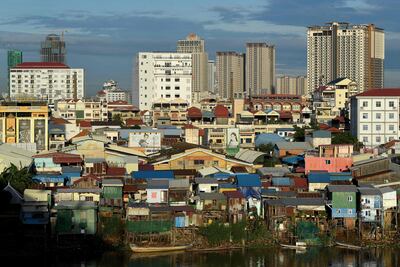
The EU tried to put pressure on Hun Sen's administration "to restore political freedoms in the country, to re-establish the necessary conditions for a credible, democratic opposition and to initiate a process of national reconciliation through genuine and inclusive dialogue", when it withdrew preferential access to 20 per cent of Cambodia's exports to the EU in 2020.
The US House of Representatives has also passed a bill recommending sanctions, but with Hun Sen drawing ever closer to a supportive China, the window for outside influence may have shut. With the world more concerned about the military takeover in nearby Myanmar, stories of abuse in Cambodia will still make the news, but the CPP appears to be in a position to ignore them.
So 30 years after the Paris accords, the record is mixed. Democracy has faded, if it ever embedded properly at all, but growth has been strong and peace has been maintained. After all that Cambodia went through from the 1970s to the 90s, that is still worth commemorating.
